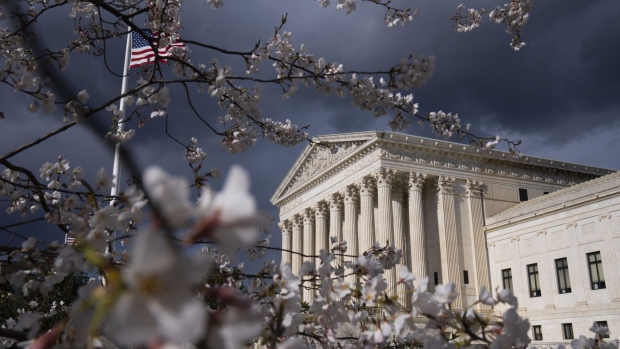May 16, 2022
Supreme Court Backs Ted Cruz in Striking Down Campaign Finance Limit
, Bloomberg News

(Bloomberg) -- A sharply divided US Supreme Court struck down a federal restriction on the repayment of candidate loans to their own campaigns, ruling against the Biden administration and in favor of Senator Ted Cruz.
Voting 6-3 along ideological lines, the justices said the 20-year-old provision violates the Constitution’s free speech guarantee. The restriction, part of the 2002 Bipartisan Campaign Reform Act, put a $250,000 cap on repayments made with money donated after the election.
In his opinion for the court, Chief Justice John Roberts said the Biden administration hadn’t shown the cap “furthers a permissible anticorruption goal, rather than the impermissible objective of simply limiting the amount of money in politics.”
The decision adds to a line of recent Supreme Court rulings striking down campaign-finance restrictions as violating the First Amendment.
In a blistering dissent, Justice Elena Kagan said post-election contributions “personally enrich those already elected to office” when the money is used to repay candidate loans.
“In allowing those payments to go forward unrestrained, today’s decision can only bring this country’s political system into further disrepute,” Kagan wrote in an opinion joined by Justices Stephen Breyer and Sonia Sotomayor.
Roberts’s fellow Republican appointees -- Justices Clarence Thomas, Samuel Alito, Neil Gorsuch, Brett Kavanaugh and Amy Coney Barrett -- joined the chief justice in the majority.
‘Return the Favor’
The Biden administration argued that the repayment cap helped prevent corruption by curbing donations that would personally enrich someone who had just won election. The Cruz campaign contended the restriction created a drag on candidate speech.
The Supreme Court has allowed campaign-finance restrictions only to prevent quid pro quo corruption -- that is, the direct exchange of money for political favors. Roberts said Monday the repayment limit was unnecessary to prevent corruption because donors are already subject to a $2,900 per-election cap on contributions.
“The loan-repayment limitation is yet another in a long line of prophylaxis-upon-prophylaxis approaches to regulating campaign finance,” Roberts wrote. He said the government hadn’t shown “a single case of quid pro quo corruption in this context,” even at the state level.
Kagan said Roberts was ignoring the “unique corruption risks” at issue in the case.
“All the money does is enrich the candidate personally at a time when he can return the favor -- by a vote, a contract, an appointment,” Kagan wrote. “It takes no political genius to see the heightened risk of corruption -- the danger of ‘I’ll make you richer and you’ll make me richer’ arrangements between donors and officeholders.”
Engineered Challenge
The Biden administration also argued that Cruz lacked legal standing to challenge the provision, because it’s not clear the $250,000 came from post-election contributions. The administration also said any harm Cruz suffered was self-inflicted.
Cruz acknowledged he structured his finances so that he could challenge the provision. He loaned his campaign $260,000 the day before the election in which he defeated Democrat Beto O’Rourke. The campaign repaid him all but $10,000, using money that Cruz says came from post-election contributions.
The Cruz campaign had $2.38 million in pre-election funds on hand after the election, according to the government.
The Supreme Court upheld the bulk of the 2002 campaign-finance law in 2003 but has invalidated multiple provisions over the years.
The case is Federal Election Commission v. Ted Cruz for Senate, 21-12.
(Updates with excerpts from Kagan, Roberts opinions starting in fifth paragraph.)
©2022 Bloomberg L.P.







